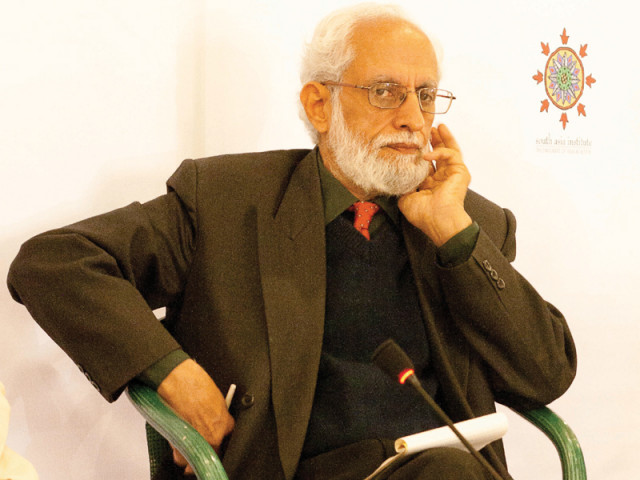Literary criticism creates a relationship between reader and writer
Bhalla, simply put it, literary criticism helps discriminate between what matters and what doesn’t matter.

Anyone who has ever studied English literature at school must have – at one point or another - pulled their hair out in despair to ask, why, why must we study literary criticism? Why is it important?
Well, as the visiting professor from the Ambedkar University in Delhi, Alok Bhalla, simply put it, literary criticism helps discriminate between what matters and what doesn’t matter.
While speaking at a session on literary criticism on the second day of the third Karachi Literature Festival, Bhalla said that the discrimination helped society grow.
The session kicked off a little late as the moderator tried to get the room temperature to warm up and Hanif Kureishi was busy signing books and checking his iPhone. As the panel and audience settled down, the nervous moderator Maniza Naqvi introduced herself as a fiction writer, ‘an imposter’, and said that she wanted to know what good was literary criticism? Critic and writer Muneeza Shamsi took the question head-on and said that there were two reasons. “For one thing, I lived in Pakistan when there weren’t any reviews or books which was very difficult for an avid reader like me,” she said. “The second is that from a historical context – the progressive writers’ movement, for example, transformed our literature.”
For German journalist and translator Stefan Weidner, literary criticism was like a discussion on literature. “When I write a review, it is like starting a discussion with the reader and author,” he said. “There is a different understanding of literary criticism in English; it’s not just about opinions. It has to have understanding, research and opinion.” Weidner has specialised in reviewing Oriental literature ie Arabic and Farsi for German dailies. He added that he would like to review Urdu books translated into German but there weren’t many available.
As the rest of the panel was busy talking on the how and why of literary criticism, a restless Kureishi sat quietly drinking his coffee. After everyone had said their two bits, Naqvi passed the microphone to Kureishi, who said that as a teacher he felt that young writers should write with readers in mind. “Say, you read someone’s book and say, well, the reader needs to have this information, he needs to know this… In this sense I don’t think of criticism as a critique,” he said. “For the young writer, it is like a set of instructions. It is important for young writers to have early readers.”
Writing 101
While talking about how she had no idea what sort of questions to prepare to the session, Naqvi mentioned that in a discussion with journalist Mirza Waheed she learnt that Kureishi’s ‘Dreaming and Scheming’ explained the process of writing and how the author communicates. According to Kureishi, it was about the experience of being a writer and about how isolating writing could be. She went on to ask the panel to explain how they would understand the reader’s choice if they didn’t have a good critic.
For Bhalla, the function of a novelist was not to write an essay. He explained his point a little more by giving the example of India author Chetan Bhagat, who according to him does not need a literary critic, just a reader. “The writer and the critic have a dynamic relationship. It is not worthless,” he said. “Some of the best writers, TS Elliot, for example, were very good critics and very self conscious of the literary tradition; so, there is always this relationship.” He added that weak literary criticism reflected a weak literary tradition. Take the example of Samuel Beckett’s Waiting for Godot, he added. “My Beautiful Launderette by Kureishi is important, because it brings new idiom, culture.”
Weidner gave the example of James Joyce. He said that Joyce’s Ulysses was translated in German fairly early because of the sexually explicit content but received bad reviews in the 1920s because it was a difficult book for the reader. He added that one literary critic even referred to it as a strange book. According to Kureishi, it was a matter of taste, not opinion. He said that if you read Re Joyce by Anthony Burgess it would tell you all you need to know. “Most criticisms are dead and worthless – neither here or there,” he said.
The question-answer session was rather amusing as a gentleman got up to ask if the critics and their criticism had killed Keats, to which Kureishi rolled his eyes and said, “I don’t understand the question.” As the discussion steered towards what the reader preferred to read, Weidner said that the readers were not stupid. He added that some of the best-selling books got the worst reviews.
Writer Bina Shah asked Kureishi how his Facebook project was coming up. She said that she had read somewhere that he was going to launch a Facebook page where young writers would be able to write and share their material. He said that he hadn’t had a chance to check up on it as he got busy with the KLF but would do so when he got back.
Towards the end of the session, Naqvi asked the panel if a writer had to be dead for 100 years to be important, to which Shamsi responded that it was not so. She gave the example of Salman Rushdie and Midnight’s Children, which has won the Booker of all Booker prizes.
Published in The Express Tribune, February 13th, 2012.



















COMMENTS
Comments are moderated and generally will be posted if they are on-topic and not abusive.
For more information, please see our Comments FAQ